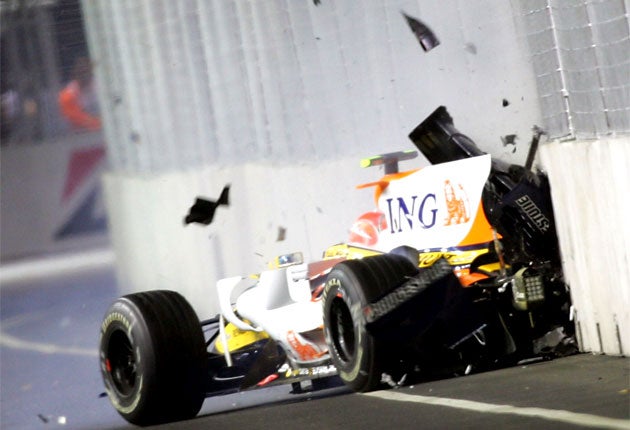James Lawton: Latest twist leaves sport's search for justice in limbo

Your support helps us to tell the story
From reproductive rights to climate change to Big Tech, The Independent is on the ground when the story is developing. Whether it's investigating the financials of Elon Musk's pro-Trump PAC or producing our latest documentary, 'The A Word', which shines a light on the American women fighting for reproductive rights, we know how important it is to parse out the facts from the messaging.
At such a critical moment in US history, we need reporters on the ground. Your donation allows us to keep sending journalists to speak to both sides of the story.
The Independent is trusted by Americans across the entire political spectrum. And unlike many other quality news outlets, we choose not to lock Americans out of our reporting and analysis with paywalls. We believe quality journalism should be available to everyone, paid for by those who can afford it.
Your support makes all the difference.When the Nelson Piquet Jnr scandal first burst upon us the most important man in Formula One, Bernie Ecclestone, agreed that the business could not be allowed to fester.
Now it is festering all over again. The decision of a Paris court to lift the bans on Flavio Briatore and his former director of engineering at Renault, Pat Symonds, may not have any great initial impact, and perhaps the derisory damages awarded both men is not the statement of vindication they were seeking.
However, the sport is faced with an extremely basic obligation.
It is to come up with a system of justice that can survive the examination of a court convened out in the real world – and which can get to the bottom of an affair which, as matters now stand, has regained its status as an open wound. It is something at least that the new president of the FIA, Jean Todt, is reported to be claiming that he's considering a new process. Now it should not be a thought but the most urgent imperative.
Briatore claims that above all he is the victim of his strained relations with Max Mosley, the former president of the FIA. Yet he and Symonds resigned their positions before claiming that they were the victims of a kangaroo court, which took the evidence of Piquet Jnr after an agreement that he would not face prosecution.
What Formula One now must ask itself is how all this appears to a disbelieving public, one that invests time and passion and expense in a sport which over recent years, and right up to yesterday, appears to be ungovernable. The answer to this question should be plain after the years of scandal and compromise, especially the McLaren espionage case and the failure to penalise drivers who just happened to benefit from it, apparently out of a reluctance to take away any of the excitement at the climax of a tense world drivers' championship.
But then everything is dwarfed by the implications of the Briatore case.
If he is innocent, who is guilty? Formula One, which in the past has lavished millions on technical development and the hiring of star drivers such as the returning Michael Schumacher, needs to attend to the question not as a thorny problem but something fundamental to its future.
If a veil can be drawn down over something as sickening as the travesty of sport which occurred at the Singapore Grand Prix, when, Piquet Jnr claims, he was ordered to crash his car deliberately, where can a line be drawn? It means that the FIA reaction to the ruling in Paris must run much deeper than the simple matter of whether to appeal or not.
There must be a resolve to make good on Ecclestone's first promise that the case would indeed be resolved, with decisiveness and as much transparency as possible.
What we have at the moment is a nightmare of irresolution over something which has attacked the whole basis of the "sport". The Football League says it was withholding a decision on whether Briatore was a fit and proper person to be involved with Queen's Park Rangers at least until the decision in Paris.
Yet its powers of deliberation can hardly have been enhanced by a verdict that seems most concerned with the procedures adopted by the FIA, a process that plainly did not satisfy some basic legal requirements.
If Formula One was some backstreet, fringe sporting activity grubbing along on a wing and prayer, this denouement might make a little bit more sense. But it is far from that. It is supposedly a sport of wealth and power. Certainly, the excitement created by the comeback of the supreme driver, Schumacher, is somewhat pushed into the margins. It is hardly easy to celebrate the return of a king to a sport which has, essentially, been pronounced deficient in the important issue of administering its own justice.
Briatore swears his innocence. For the time being, though, it is something he appears not to have to prove. We know you are innocent until proved guilty. But it is a principle more easily embraced when there exists a proper means of finding out.
This is something, Formula One discovered in Paris yesterday, that can no longer be shelved. Not if the sport of Fangio and Ascari and Schumacher wants to retain even a wisp of credibility.
Join our commenting forum
Join thought-provoking conversations, follow other Independent readers and see their replies
Comments